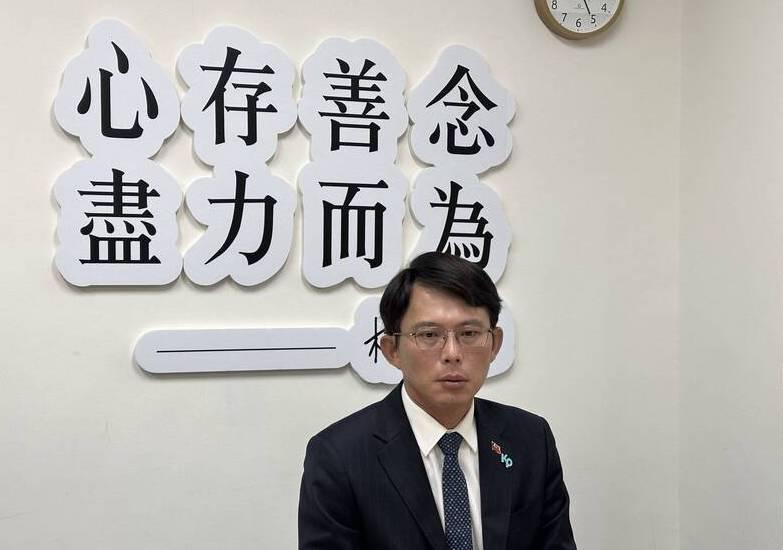Taiwan People’s Party (TPP) Chairman Huang Kuo-chang (黃國昌) said today that he plans to run in next year’s New Taipei City mayoral election.
The TPP’s national congress yesterday did not change its policy that legislators-at-large step down after two years.
In an interview with the online news platform “Stop Pretending” this morning, Huang said that the two-year clause was a promise made by TPP founder and former chairman Ko Wen-je (柯文哲), and that he agrees with the policy.

Photo: Taipei Times
After leading the TPP in the Legislative Yuan for two years, Huang said he would step down from the role on Jan. 31 next year along with other current TPP legislators-at-large.
TPP legislators Chang Chi-kai (張啓楷) and Lin Kuo-cheng (林國成) have done well and would aim to “obtain executive power” in the future, starting with next year’s county commissioner and city mayoral elections, he said.
Responding to questions from the program host, Huang said he would run in the New Taipei City mayoral election next year.
The risk is high if three candidates run, because if the TPP and Chinese Nationalist Party (KMT) candidates each receive 30 percent of the vote, the Democratic Progressive Party candidate could win with just 35 to 40 percent, Huang said.
The KMT is a large and powerful party with many outstanding members, and has much to consider, he said.
He added that the KMT and TPP are willing to talk with each other, but the KMT responded “rather coldly” when he reached out with goodwill.
Huang said his first priority is to unseat President William Lai (賴清德) in the 2028 elections and would not do anything to jeopardize that goal.
He said his second guiding principle is that he would not run if he was not confident he could win.
The TPP cannot just cling to a few seats in the Legislative Yuan — it must branch out and expand its presence across the country, he added.

Taiwan has received more than US$70 million in royalties as of the end of last year from developing the F-16V jet as countries worldwide purchase or upgrade to this popular model, government and military officials said on Saturday. Taiwan funded the development of the F-16V jet and ended up the sole investor as other countries withdrew from the program. Now the F-16V is increasingly popular and countries must pay Taiwan a percentage in royalties when they purchase new F-16V aircraft or upgrade older F-16 models. The next five years are expected to be the peak for these royalties, with Taiwan potentially earning

STAY IN YOUR LANE: As the US and Israel attack Iran, the ministry has warned China not to overstep by including Taiwanese citizens in its evacuation orders The Ministry of Foreign Affairs (MOFA) yesterday rebuked a statement by China’s embassy in Israel that it would evacuate Taiwanese holders of Chinese travel documents from Israel amid the latter’s escalating conflict with Iran. Tensions have risen across the Middle East in the wake of US and Israeli airstrikes on Iran beginning Saturday. China subsequently issued an evacuation notice for its citizens. In a news release, the Chinese embassy in Israel said holders of “Taiwan compatriot permits (台胞證)” issued to Taiwanese nationals by Chinese authorities for travel to China — could register for evacuation to Egypt. In Taipei, the ministry yesterday said Taiwan

‘LIKE-MINDED PARTNER’: Tako van Popta said it would be inappropriate to delay signing the deal with Taiwan because of China, adding he would promote the issue Canadian senators have stressed Taiwan’s importance for international trade and expressed enthusiasm for ensuring the Taiwan-Canada trade cooperation framework agreement is implemented this year. Representative to Canada Harry Tseng (曾厚仁) in an interview with the Central News Agency (CNA) said he was increasingly uneasy about Ottawa’s delays in signing the agreement, especially as Ottawa has warmed toward Beijing. There are “no negotiations left. Not only [is it] initialed, we have three versions of the text ready: English, French and Mandarin,” Tseng said. “That tells you how close we are to the final signature.” Tseng said that he hoped Canadian Prime Minister Mark Carney

POSITIVE DEVELOPMENT: Japan and the US are expected to hold in-depth discussions on Taiwan-related issues during the meeting next month, Japanese sources said The holding of a Japan-US leaders’ meeting ahead of US President Donald Trump’s visit to China is positive news for Taiwan, former Japan-Taiwan Exchange Association representative Hiroyasu Izumi said yesterday. After the Liberal Democratic Party’s landslide victory in Japan’s House of Representatives election, Japanese Prime Minister Sanae Takaichi is scheduled to visit the US next month, where she is to meet with Trump ahead of the US president’s planned visit to China from March 31 to April 2 for a meeting with Chinese President Xi Jinping (習近平). Japan and the US are expected to hold in-depth discussions on Taiwan-related issues during the